Staying competitive in eCommerce requires you to offer more than just a great product. Nowadays, being competitive means utilizing the latest tech. This isn't just to show your customers you're savvy with the latest tools. It has more to do with the benefits of these tools.
AI tools are quite spread in modern marketing. In fact, 35% of companies are using them specifically for marketing and advertising. AI tools for eCommerce are used for more than these two reasons. From product recommendations to writing captivating descriptions, these tools revolutionize the way we do online commerce.
However, the market is over-represented by these tools. This makes the decision of picking the right one far from straightforward. Luckily, we've got you covered. So let's explore the top 10 AI eCommerce tools.
What Are AI eCommerce Tools?
AI eCommerce tools are intelligent software solutions designed to enhance and streamline various aspects of an online store's operations. These tools leverage advanced algorithms and machine learning techniques to provide businesses with powerful insights, automation, and personalization capabilities. AI eCommerce tools are designed to work seamlessly with existing eCommerce platforms, integrating with popular platforms like Shopify, WooCommerce, and Magento.
Benefits of Using AI Tools in eCommerce
These tools offer a range of benefits that can transform how your eCommerce business operates, enhance customer satisfaction, and drive growth. Below, we explore the key advantages of integrating AI into your eCommerce strategy.
1. Jasper.ai
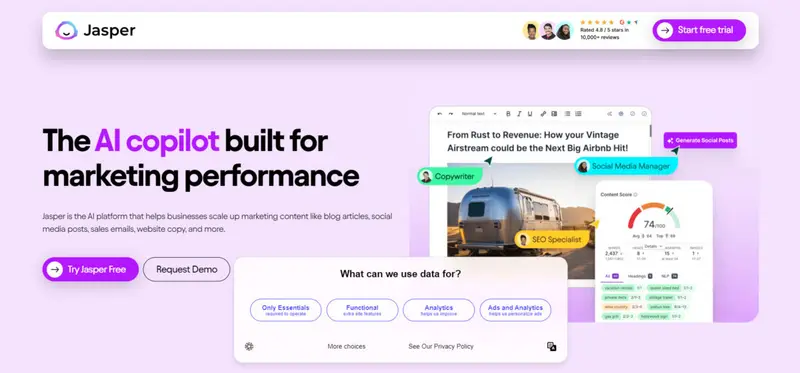
The overall customer experience plays a huge role in the success of every eCommerce brand. Another area that’s equally important is the content, particularly product descriptions.
For this, there’s Jasper — one of the top AI marketing tools. Best for small and mid-sized businesses, it includes an AI-powered product description generator in its toolkit. It’s a great sidekick if you’re experiencing writer’s block or merely want to save time. What’s more, it works in 29 languages.
To get started, you simply open the product description template and add your prompt. For the prompt, you basically just need to share more details about your business and its brand voice.
In addition to product descriptions, it can help with various other types of content that eCommerce businesses regularly use such as Facebook Ads. For example, if you want to use it for paid ads, it can share a different angle and help you understand your buyer personas better. Then, there are also a number of useful writing tools that you can use like a sentence rewriter, slogan generator, and paraphrasing tool.
It also offers integration with Surfer, one of the leading SEO tools. This means that the content that gets generated for you will also be optimized for search engines by incorporating the keywords tailored to your specific business and niche.
Key features include:
- Blog post creation
- Project folders to streamline multiple projects
- Plagiarism checker access
Plans and pricing:
After a free five-day trial, pricing starts at $49 per month.
2. Clerk.io
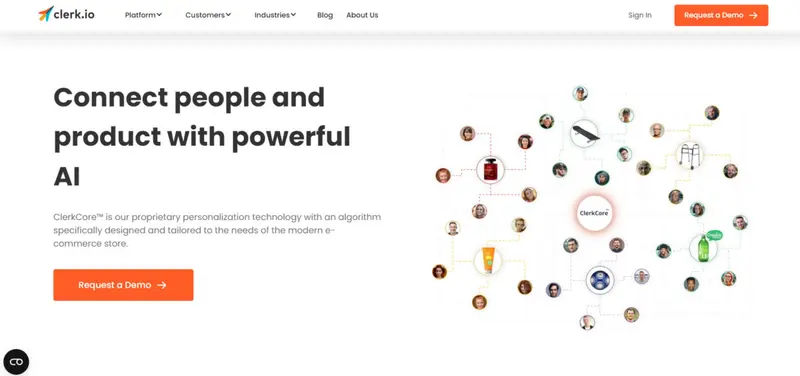
ClerkCore describes itself as a proprietary personalization technology that uses an algorithm created specifically with eCommerce stores in mind. Included in its long list of features are real-time indexing, directional synonyms, automatic product analysis, and multilingual support.
Thanks to its natural language processing capabilities, it can automatically identify the actual search intent. If there’s a typo, it won’t throw it off guard thanks to the typo tolerance. What’s more, with its built-in synonym detection, it will even be able to identify words with similar meanings automatically to ensure that all relevant search results get displayed.
In addition to helping with search, it also offers smart product recommendations to drive more sales. It will automatically display to customers the products that they’re most likely to add to their carts. These recommendations can also be applied to content.
All in all, it’s one of the best tools to use for customer experience optimization. As it’s specifically aimed at eCommerce businesses, they know how to convert searches into sales.
Key features include:
- Real-time search and product analytics and insights
- Email triggers
- Segmentation
Plans and pricing:
For more info about Clerk.io’s pricing, please refer to their website.
3. Syte

If you need help with product discovery, you can check out Syte. It’s a great tool for brands, marketplaces, and retailers of all sizes selling jewelry, home decor, and fashion specifically.
Powered by visual AI, it helps customers to find the products that they’re looking for faster, helping to improve conversions, average order value, and lifetime value. For example, for Coleman Furniture, they managed to increase the conversion rate by just over sevenfold.
Moving forward, customer experience is only going to matter more and more to consumers. With Syte in your tech stack, creating premium experiences becomes much easier.
Much of this is thanks to its hyper personalization. Using session data and visual AI, you can share very relevant product recommendations. For example, if you operate in the home decor niche, you can use Syte to showcase similar products to those that are out of stock. Another way that it can drive sales is by suggesting accessories that will work well with a room.
If you do get stuck, the Syte team has been highly praised online. Not only will they enhance your customer’s journey, but they also make a concerted effort that your own user journey is seamless.
Key features include:
- Sophisticated personalized recommendations
- Image search
- Automated product tagging
- Thematic tags
- Deep tag analytics
Plans and pricing:
For more info about Syte’s pricing, you need to reach out to them directly.
4. Jacquard

Similar to Syte, Jacquard also focuses on improving customer experiences. It offers an AI platform that helps brands and marketing teams create on-brand messages across various popular channels, including email and SMS.
If you specifically need help with paid media, which plays a big part in running any eCommerce business, it offers AI-powered content that will help your social media ads to generate better results. What makes it such a great tool though, is that it keeps in mind the different stages of the customer journey and will optimize the language accordingly.
Its client list is equally impressive and includes market leaders in eCommerce like eBay and Sephora. Since Jacquard partnered with eBay in 2016, they’ve helped them to create a consistent ROI across all campaigns. On average, they help them to generate 700,000 incremental opens and 56,000 incremental clicks per campaign.
Key features include:
- Dynamic optimization
- Integration with all the leading email service providers
Plans and pricing:
For more info about Jacquard’s pricing, you need to reach out to them directly.
5. Bazaarvoice

Bazaarvoice recently acquired Granify and has integrated the eCommerce tool into its platform stack. This tool works with eCommerce brands across various industries including home decor, fashion, and electronics.
Bazaarvoice’s goal is simple, yet ambitious. They want to change how people shop online. In short, it’s a conversion/revenue optimization platform that uses machine learning and real-time big data. It automatically identifies shoppers that won’t buy and before they leave the website tries to change their mind.
To do this, it identifies opportunities that can be optimized that will mean more chances of conversion and then use dynamic personalization. Only when the numbers prove that Granify can make a difference will it take action.
Key features include:
- Dynamically personalized and highly targeted product spotlights
Plans and pricing:
Get in touch with them to know more about Bazaarvoice’s platform pricing
6. LivePerson
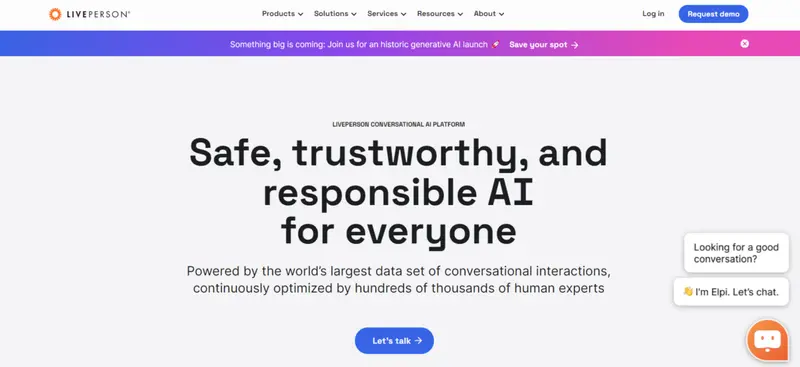
If you want to leverage the power of conversational commerce, you can check out LivePerson. It’s a conversational AI company that’s trusted by thousands of brands that include big names like Burberry and Chipotle. Each month, their Conversational Cloud powers almost a billion conversational interactions.
As their LinkedIn page so eloquently summarizes it, they create “digital experiences that are curiously human”. Unlike many tools in this niche that think using a fun, friendly tone equates to personalization, the team behind LivePerson takes it further. They help your brand to set itself apart by empowering it to create one-on-one eCommerce customer experiences that include real-time product recommendations and support.
This means that you can benefit from the advantages that AI has to offer, while at the same time let your target audience feel like their interactions are unique. You can, for instance, use out-of-the-box integrations to share accurate shipping updates or use AI-powered chatbot conversations to streamline returns and exchanges. These features have helped some of their retail clients slash the cost of care in half, while at the same time increasing customer satisfaction by 20%.
Key features include:
- Intent-based automation
- Out-of-the-box integrations to gain insight into past purchases
Plans and pricing:
For more info about LivePerson’s pricing, you need to reach out to them directly.
7. ViSenze
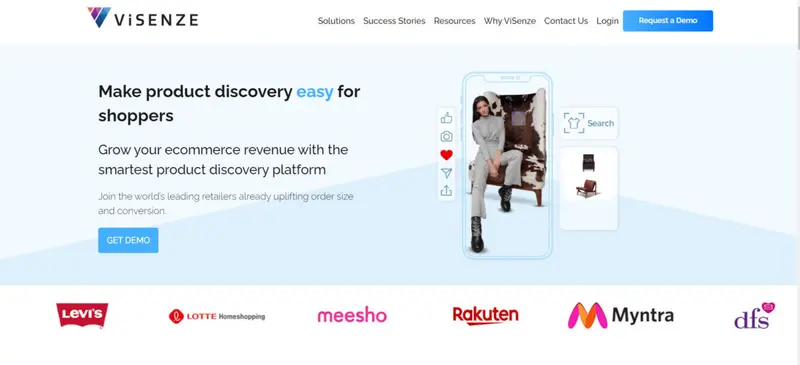
For an alternative to Syte, you can try ViSenze. It’s one of the top AI search and discovery software solutions used by merchants, retailers, and brands that include names like Rakuten and H&M. Founded in 2012, it was recently recognized by Datamation as one of the top AI companies.
Thanks to its automated AI platform, it helps retailers to create first-class customer experiences by helping them to discover products faster. This ultimately helps to drive more sales.
All in all, it’s easy to set up and you can quickly integrate your entire product catalog from various eCommerce platforms. Then, to help you make the most of its capabilities, it also includes A/B testing to help you hit the sweet spot for each placement and shares instant insights to let you find out more about your target audience.
Key features include:
- Enhanced visual search
- Product tagging
- Smart product recommendations
- Merchandising analytics
Plans and pricing:
For more info about ViSenze’s pricing, you need to reach out to them directly.
8. Blueshift
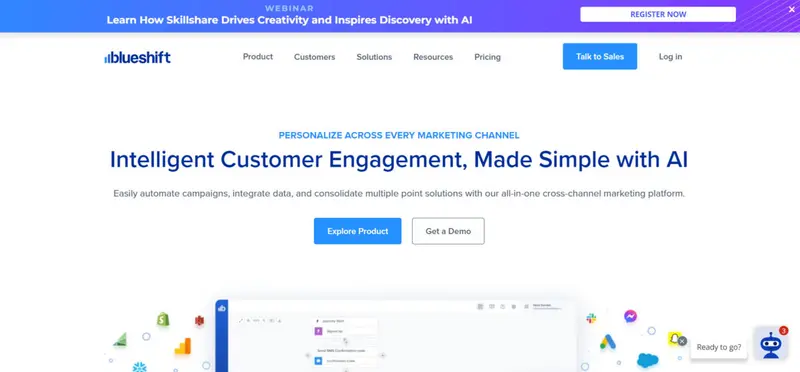
Just like many of the other AI eCommerce tools on this list, Blueshift also shifts the attention to customer experiences. Using patented AI technology, it helps users to create one-on-one experiences in real-time across the buyer’s journey.
If you specifically want to focus on paid marketing, it’s one of the best AI tools to use. It leverages first-party, behavioral, and predictive data to make it easier for brands to optimize their ad budgets.
In addition to paid media, it also works with most mainstream channels including SMS, email, and in-app messages. So, if your eCommerce site also has an app, you can use dynamic adaptive messages to make the most in-app interactions. Alternatively, if your shoppers mostly stick to website purchases, it also offers personalized product and content recommendations as well as triggered browser push notifications to improve the shopping experience.
Key features include:
- Automated email outreach
- Personalized push notifications
- Tailored SMS messages
- A/B testing
Plans and pricing:
Blueshift offers three tailored pricing packages (including enterprise pricing). There is a free plan available. Paid plans start at $750/month.
9. Seventh Sense

If you specifically want to focus on email marketing and use Marketo or HubSpot, Seventh Sense might just be that extra sense that you needed. It offers automated delivery and frequency optimization using its “The Time Optimized Sales Model”.
Its AI software quietly listens to how customers are interacting with your brand by means of email, HubSpot, and Marketo. It specifically focuses on time to help you visualize patterns. Armed with this insight, you’re empowered to connect with your customers at the best time. The result — better engagement and results.
If you’re worried that your new email activity will trigger spam filters, it includes email throttling. This way, you can enjoy peace of mind knowing that the number of emails sent to ISPs and remote servers at one time get controlled. Should something go wrong, you can always pause email campaigns easily and resume your email marketing campaign once the problem has been sorted out.
Key features include:
- Send time optimization
- Email frequency optimization
- Historical engagement data
- Lookalike audience scheduling
Plans and pricing:
Pricing for HubSpot users starts at $80 per month for 5,000 marketing contacts. Pricing for Marketo users starts at $450 per month for 50,000 leads.
10. Clarifai
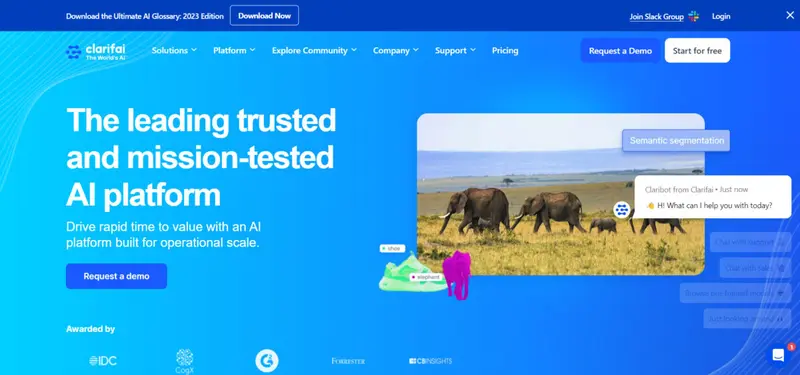
Unlike a number of the other tools that focus purely on visual search optimization, Clarifai does that and more. Included in its list of use cases are digital asset management, facial recognition, and content moderation.
Thanks to its content moderation, it’s a great tool if you rely heavily on user-generated content. With the help of its image and text moderation models, you can double-check that any images and videos that get uploaded are free of unwanted elements. It can also be used to moderate text-based content, such as customer reviews and social media posts, to ensure there’s nothing racist or just plain obscene.
Another useful feature is its sophisticated natural language processing that can identify the intent behind messages. If you use a chatbot on your website, this can come in handy helping you to deliver better customer service.
Then, to help you with search engine optimization, it includes sophisticated AI automated data labeling. This way, you can label your visual data automatically using the relevant keywords to reduce bounce rates.
Key features include:
- Content moderation
- Metadata generation
- Product recommendations
Plans and pricing:
Clarifai offers a free forever plan and two paid options. Pricing starts at $30 per month.
Key Features To Look For in AI eCommerce Tools
When selecting AI eCommerce tools, consider these key features to ensure they align with your business needs:
Integration Capabilities
When choosing AI tools, it's essential to select those that seamlessly integrate with popular eCommerce platforms like Shopify, WooCommerce, or Magento. For instance, Jasper.ai integrates with Surfer SEO, enhancing content with SEO optimization tailored to your business niche. Similarly, LivePerson offers out-of-the-box integrations that enable real-time product recommendations and support, ensuring smooth data flow and minimal disruptions to your operations.
Personalization Features
Advanced personalization is a must for AI tools in eCommerce. Clerk.io, for example, offers smart product recommendations based on real-time customer behavior, enhancing the shopping experience and driving sales. Syte takes personalization further by using visual AI to provide hyper-relevant product recommendations, improving conversion rates significantly.
Automation of Tasks
Automation is key to reducing operational costs and saving time. Tools like Jasper.ai automate content creation, from product descriptions to social media ads, freeing up valuable time for your team. Bazaarvoice leverages machine learning to dynamically personalize content and optimize conversion opportunities, taking action only when it’s most effective.
Analytics and Reporting
Robust analytics and reporting features are crucial for tracking performance metrics and making data-driven decisions. Clerk.io offers real-time analytics and insights, helping you understand customer behavior and optimize your strategy accordingly.

Source: Clerk.io
Scalability
As your eCommerce store grows, you need tools that can scale with you. Syte, designed for businesses of all sizes, ensures that as your traffic and operations expand, it can handle increased demand without compromising performance. LivePerson also supports scalability by managing almost a billion conversational interactions each month, making it suitable for both small and large enterprises.
User-Friendly Interface
A user-friendly interface is essential for quick implementation and ease of use. Jasper.ai offers a straightforward product description template that requires minimal input, allowing you to generate content quickly. Jacquard provides an intuitive platform that helps you create on-brand messages effortlessly across various channels, minimizing the learning curve.

Source: Jacquard
Security Features
Security is non-negotiable in eCommerce. Tools like LivePerson offer strong security measures, such as intent-based automation and insights into past purchases, which help protect customer data and transactions. This not only builds trust but also ensures compliance with industry regulations, safeguarding your business and your customers.
Wrapping Things Up
Just like eCommerce sales surged during the past two years, so too did the use of AI. A lot has been written about AI in marketing. While marketing plays a huge role in running a successful eCommerce store, so do other aspects like customer experience. And, with this, AI can also be of service. However, if you simply want to stick to it for faster content generation for now, that’s perfectly fine as well.
Most of the tools mentioned on this list, though, don’t publicly share pricing information. In any case, as this type of tech is still quite new to most, it’s a good idea to take advantage of demos offered. This way, you’ll not only get the pricing info, but you’ll also familiarize yourself with the capabilities and identify the best solution for your budget and needs.
Frequently Asked Questions
Which AI is used in e-commerce?
AI in eCommerce typically includes machine learning, natural language processing, and computer vision. These technologies are used for personalized recommendations, chatbots, dynamic pricing, and visual search, among other applications.
How can AI be used in online shopping?
AI enhances online shopping by offering personalized product recommendations, improving search functionality, automating customer support with chatbots, and providing dynamic pricing based on market trends and customer behavior.
Does Shopify offer AI tools?
Yes, Shopify offers AI-powered tools such as Shopify Inbox for automated customer support, as well as AI-driven product recommendations and marketing insights to help merchants optimize their stores.
How to use AI to increase eCommerce sales?
To increase eCommerce sales with AI, you can implement personalized product recommendations, use chatbots for customer engagement, optimize pricing dynamically, and leverage AI-driven marketing strategies to target the right customers with the right messages.
What are AI eCommerce tools?
AI eCommerce tools are software applications that leverage artificial intelligence to automate and optimize various aspects of online retail, enhancing customer experiences and streamlining operations.
How do AI tools personalize shopping experiences?
AI tools analyze customer behavior and preferences to deliver tailored product recommendations, personalized marketing messages, and customized shopping experiences.



